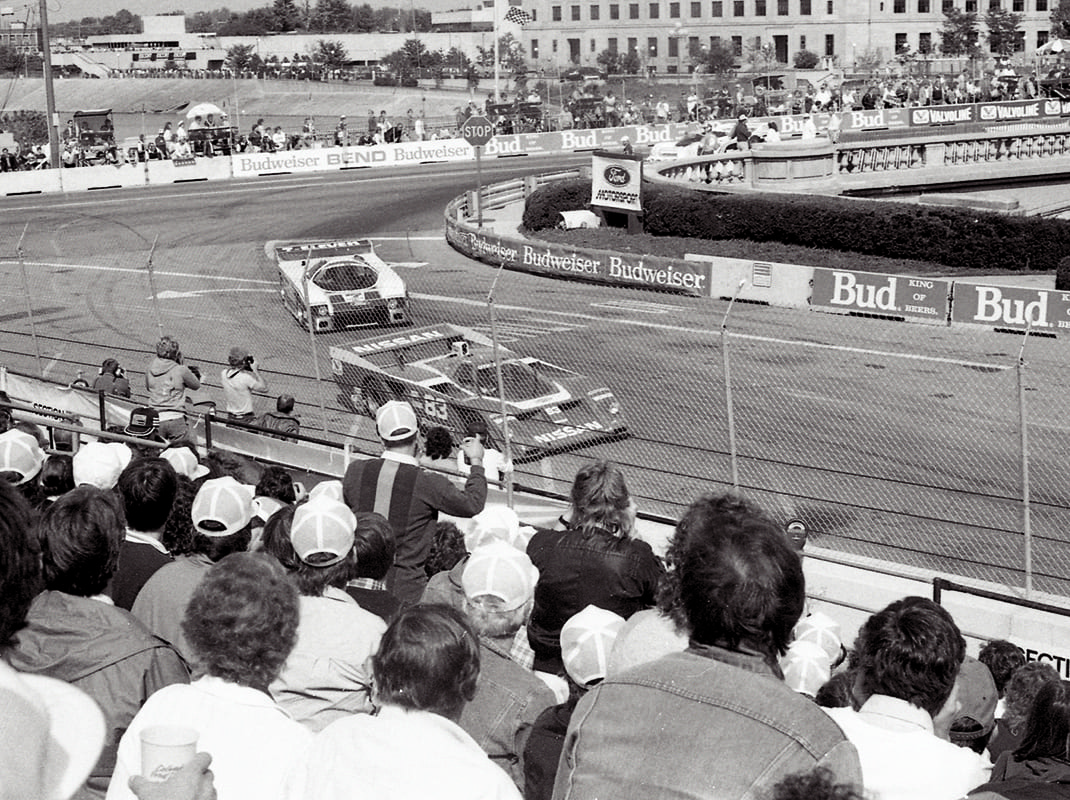[subscribers_only]
Treating people nicely seems to be the biggest thing that went right at IMSA’s first race.
In search of bigger crowds, Bishop introduced international endurance racing to North America in 1971 via Grand Touring cars. Camel Cigarettes became the new sponsor of the GT series a year later and the Camel GT series marked one of the golden eras of IMSA.
Whole books have been written on that subject, as well as other noteworthy IMSA series like the IMSA Exxon World Sports Car Championship, IMSA GTO, GTU, GTP, GTS, IMSA Firestone Firehawk Endurance Championship, Kelly Girl Challenge, Baby Grand, BF Goodrich Radial Challenge and Champion Spark Plug Challenge, etc.
In 1989, the Bishops sold the company to the owners of the IMSA Grand Prix of St. Petersburg and Mark Raffauf became its head. During the early 1990s, it was sold again. In 1996, it changed hands once more and its name was changed to Professional Sports Car Racing.
To further muddy the waters, a couple of years later the United States Road Racing Championship was revived to compete against PSCR, which eventually made way for the ALMS and Grand-Am.

The plot is definitely complicated, but this year IMSA is putting all the different initials behind it, relishing all of sports car racing’s historical twists and turns and publicizing its 50th anniversary and the cars and drivers that made it possible.
Teams will be using historic liveries on their cars throughout the season and Gregg Elkin, IMSA’s communications director, said there will be historic displays at each event and when available, historic cars will do parade laps before the races.
“We will also have former drivers at each race for Q&As with the fans,” he added. Scott Pruett was the grand marshal for the Rolex 24 and handled that duty at Daytona.
“IMSA is going to be the featured marque at the Rolex Monterey Motorsports Reunion in August,” Elkin noted. “That will be a weeklong celebration of all things IMSA that will include cars, driver Q&As and activation by many of our 19 OEM partners with displays, etc.”
That event, which typically features more than 500 vintage race cars in an open-paddock format, will be held Aug. 15-18 at California’s WeatherTech Raceway Laguna Seca.
“We debuted our 50th anniversary book in August and it is still on sale at IMSA.com/50,” Elkin added. “It was commissioned by the folks at Racer and is a 216-page look at the history of the series. It includes a list of the 50 greatest drivers in IMSA history.” Only 2,000 copies of the book were produced. Entited “IMSA: Celebrating 50 Years,” it retails for $170.
Another significant book is “IMSA 1969-1989: The Inside Story of How John Bishop Built the World’s Greatest Sports Car Racing Series.” Written by Mitch Bishop, John and Peggy’s son, and veteran IMSA official Mark Raffauf, IMSA’s senior director of race operations, it was published by Octane Press. Its launch was at the Rolex 24 in January.
Event programs throughout 2019 will also feature historical articles.
“Every race weekend we will feature stories in the program that look back at the history at each venue,” Elkin said. “We will also be doing a series of social media campaigns that will feature a look back at races and the great moments in our history around tracks as well. Throughout the season we will have stories about these drivers on our website at imsa.com as well.”
Those who prefer videos are in luck, too.
“We introduced a series of videos toward the end of last year with current and former drivers that are available on our YouTube channel, and that will continue through the year,” Elkin explained.
At press time, 12 videos had been released so far, each offering quick snippets from some famous drivers such as Oliver Gavin, Tommy Kendall, Bill Auberlen, Scott Pruett, Patrick Long, Joao Barbosa, Wayne Taylor, Derek Bell, Bobby Rahal and Hurley Haywood.
What does the future hold?
With all-electric and driverless cars on the horizon, it’s difficult to tell what sports car racing will look like during the next 50 years. But with the unification of North American professional sports car racing under the IMSA banner once again, a good TV partner in NBC Sports, a good tire partner in Michelin and a couple of sports car racing movies in the works that could speak to a non-sports car racing crowd, it’s much healthier than it’s been in other periods during the last 50 years.
If nothing else that deserves a champagne toast, or at the very least a beer in the infield.
[/subscribers_only]
